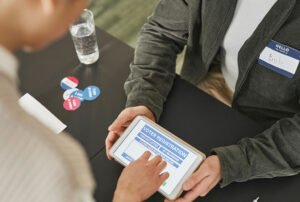
November 29, 2017; Bloomberg
As many know, pharmaceutical companies have gotten into the habit of increasing prices dramatically on drugs even as they provide charitable contributions to patient assistance charities to allay the private copay costs of drugs. This could imply, if one were a skeptic, the systematic collusion between drug companies and charities that would hurt both consumers and taxpayers, so there are strict federal requirements regarding favoritism in what drugs get subsidized and access to data by drug companies. Still, active investigations have been going on for years that clearly indicate that in some of these organizations, any firewalls that exist are pretty darn porous and that their business models and those of the drug companies are codependent.
On Tuesday, the Office of the Inspector General (OIG) at the US Department of Health and Human Services (HHS) rescinded its authorization of a patient assistance charity for being in too close a relationship with its donors. “It’s the first time the OIG has rescinded a favorable advisory opinion for a patient assistance charity,” according to Tesia Williams, an OIG spokeswoman.
The letter to the Caring Voice Coalition, a redacted version of which was posted on the HHS website, reads in part that the nonprofit served as a conduit for…
financial assistance from a pharmaceutical manufacturer donor to a patient, and thus increased the risk that the patients who sought assistance from Requestor would be steered to federally reimbursable drugs that the manufacturer donor sold. This type of steering can harm patients and the Federal health care programs, because, for example, patients may be urged to seek, and physicians may be more likely to prescribe, a more expensive drug if copayment assistance is available for that drug but not for less expensive but therapeutically equivalent alternatives. In these circumstances, manufacturers may have greater ability to raise the prices of their drugs while insulating patients from the immediate out-of-pocket effects of price increases, leaving Federal health care programs like Medicare (and the taxpayers who fund those programs) to bear the cost.
Sign up for our free newsletters
Subscribe to NPQ's newsletters to have our top stories delivered directly to your inbox.
By signing up, you agree to our privacy policy and terms of use, and to receive messages from NPQ and our partners.
The OIG authorizes organizations to act as charitable entities in independence from drug companies in distributing patient assistance funds and services. In this case, the OIG is saying that a boundary has been breached and is moving to rescind its authorization of the charity—which likely means that the drug companies will cease using the body.
OIG cannot agree to Requestor’s proposal to further modify 06-04, because Requestor allowed donors to directly or indirectly influence the identification or delineation of its disease categories. This practice directly contravened the specific safeguards Requestor promised to follow and upon which OIG relied in issuing the advisory opinion.
Apparently, OIG found that Caring Voice allowed their pharmaceutical donors access to data that informed the companies “greater ability to raise the prices of their drugs while insulating patients from the immediate out-of-pocket effects,” in the end forcing Medicare to pay for the cost increases.
Pharmaceutical companies increased their donations to copay charities in recent years, often in tandem with large increases of the price of drugs. Under federal law, drug companies can’t give direct copay help to patients covered by Medicare—which would be considered an illegal kickback because it could steer patients to one drug or another. Instead, they’re permitted to donate to independent charities that help Medicare patients, provided the companies don’t exert sway over how the nonprofits operate.
—Ruth McCambridge












